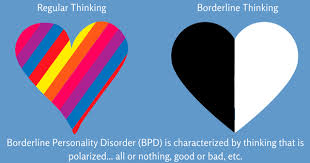Borderline Personality disorder
Borderline Personality disorder

Borderline Personality Disorders
Photo credit: Google
Borderline personality disorder (BPD) is a mental health disorder that affects how you feel and think about yourself and those around you. It is characterized by a pattern of unstable emotions, self-image, and interpersonal relationships. People with BPD often experience intense and erratic emotions, making it difficult for them to regulate their feelings effectively. This emotional turbulence can lead to impulsive behaviors, self-harm, and strained relationships, creating a significant impact on their overall quality of life.
This condition starts in early adulthood, worsens in young adulthood, and becomes better as you age.
Symptoms of Borderline Personality Disorder
BPD manifests through a range of symptoms, making its diagnosis challenging even for mental health professionals. Some of the hallmark signs of BPD include:
- Intense fear of abandonment
- Frequent mood swings
- Identity disturbances
- Self-destructive behavior
- Chronic feelings of emptiness
- Difficulty controlling anger.
Causes and Risk Factors
The causes of borderline personality disorder are not clear. But the origins are multifactorial, factors like genetics, brain structure, function, family history, and cultural and social factors may increase your risk of having BPD. Studies suggest that individuals with a family history of BPD or other personality disorders may have a higher risk of developing the condition.
Childhood trauma, neglect, or abuse can also contribute to the development of BPD. Adverse experiences during formative years can shape one's emotional regulation capabilities, leading to heightened vulnerability to BPD later in life.
Breaking the Stigma
Unfortunately, BPD has been stigmatized in society, leading to misconceptions and reluctance to seek help. This section aims to debunk common myths surrounding the disorder, such as the belief that individuals with BPD are manipulative or untreatable.
Through spreading awareness and fostering empathy, we can create an environment that supports those affected by BPD, encouraging them to seek professional help without judgment or shame.
Effective Treatment Approaches
Managing BPD requires a multidimensional approach, and various therapeutic modalities have shown promising results. Dialectical Behavior Therapy (DBT) is one of the most widely used and effective treatments for BPD, emphasizing skills to manage emotions, cope with distress, and improve interpersonal relationships.
Cognitive-Behavioral Therapy (CBT), Schema Therapy, and psychodynamic approaches have also been utilized to address specific aspects of BPD symptoms. Medication may be prescribed in some cases to target co-occurring conditions such as depression or anxiety.
Support for Family and Friends
Borderline Personality Disorder can be profoundly challenging for loved ones, who often grapple with feelings of helplessness and frustration. This section explores strategies to offer support and understanding to individuals with BPD, as well as self-care tips for caregivers to maintain their well-being.
Conclusion
Borderline Personality Disorder is a complex condition that demands empathy, understanding, and effective treatment. By dismantling the stigma surrounding BPD, increasing awareness, and providing comprehensive support, we can help individuals affected by this disorder embark on a journey towards healing, growth, and a life filled with meaningful connections. Remember, it's essential to consult qualified mental health professionals for personalized assessment and treatment.
Learn to accept you and live your life to fulfillment.
Also read;
